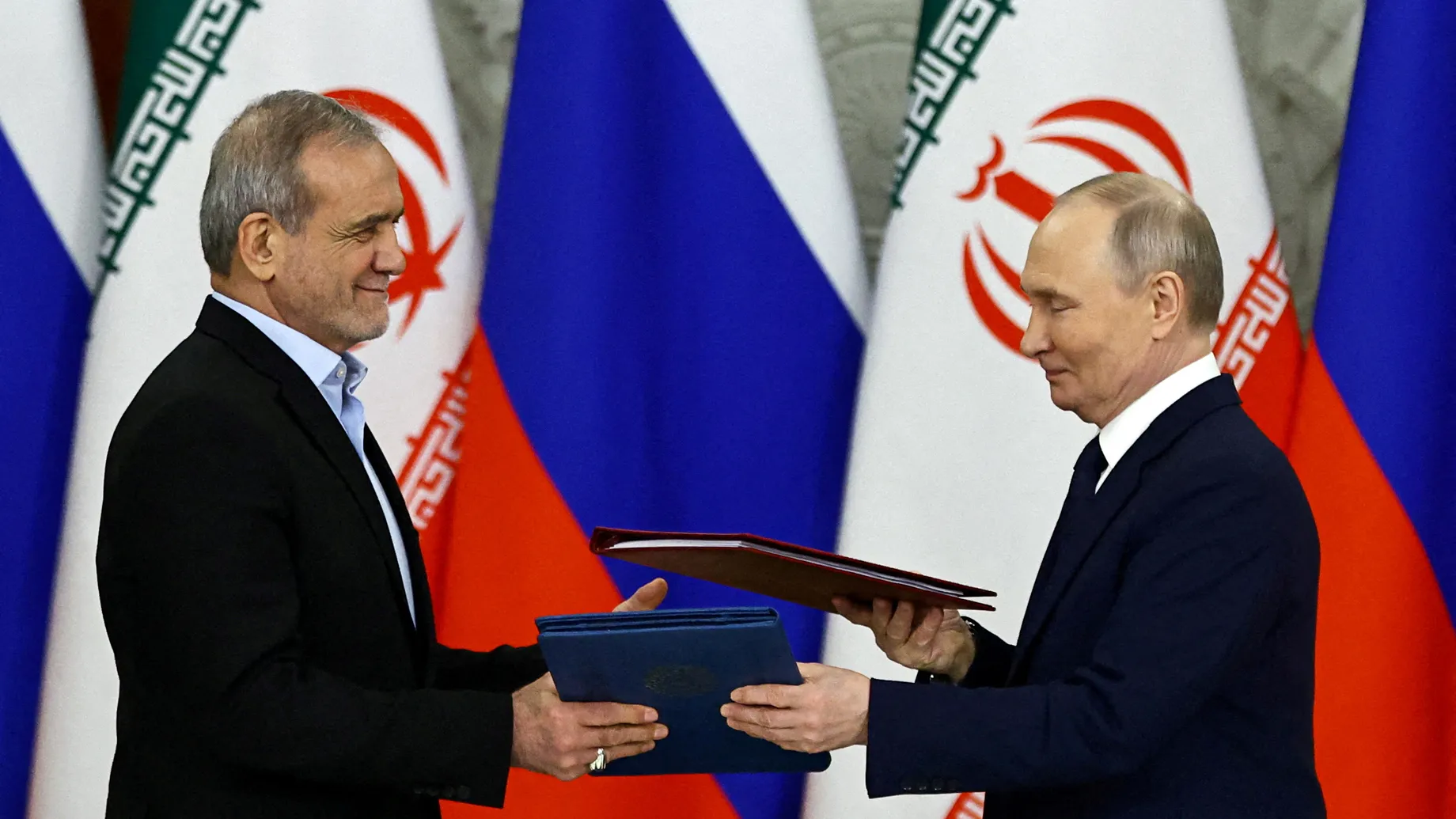In January of this year, Iranian President Masoud Pezeshkian visited Moscow to sign a “comprehensive strategic partnership” agreement with Vladimir Putin. This move marked a logical continuation of the alignment process that began in 2022, following Russia’s invasion of Ukraine. At that time, Moscow began actively seeking allies among countries facing Western sanctions — such as Iran and North Korea.
Vladimir Putin made this alliance clear in October 2024: “Our relationship with Iran is that of allies.” But how solid is this so-called alliance in reality?
This question has become increasingly urgent, as the Iranian regime is now facing one of the most difficult moments in recent history and is in desperate need of external support. Yet despite Moscow’s harsh rhetoric in response to Israel’s recent airstrikes on Iranian territory, its concrete actions remain very limited.
Russia’s Foreign Ministry issued a strong condemnation: “Unjustified military strikes against a sovereign UN member state, its citizens, sleeping cities and nuclear infrastructure are categorically unacceptable.” What the statement failed to mention is that Moscow continues to bomb sleeping cities in Ukraine. The statement also denounced the strikes as “particularly cynical” given that Iran and the United States were in the midst of diplomatic talks. But harsh words aside, Moscow made no move to intervene.
A Paper Alliance: Why Russia Isn’t Coming to Iran’s Aid
The truth is, the agreement between Russia and Iran lacks a crucial clause — a commitment to provide military assistance in the event of external aggression. Such a clause is included in Moscow’s 2024 pact with North Korea, which outlines mutual defense in case either party is attacked. The Iranian agreement only includes a vague pledge not to support the aggressor.
Moreover, Putin shares little political or personal affinity with Iran’s current moderate president, Masoud Pezeshkian. His relations were far warmer with Pezeshkian’s predecessor, the hardline conservative Ebrahim Raisi. And Russia’s broader strategy in the Middle East requires it to maintain good ties not just with Iran, but also with its regional rivals such as Saudi Arabia and the UAE.
In practice, the Russian-Iranian relationship is more of a tactical alliance than a deep strategic one. It thrives under two conditions: international pressure on both countries, and mutual dependence on military assistance. After Russia invaded Ukraine, both conditions were in place: Moscow was internationally isolated and found itself unexpectedly reliant on Iran’s Shahed drones due to difficulties on the battlefield. But by 2025, Russia had significantly expanded its own drone production, and its concern about diplomatic isolation had waned.
Israel’s Strikes: A Geopolitical Gift to the Kremlin
Paradoxically, the Israeli strikes on Iran offer certain strategic benefits to Moscow. First, they drive up global oil prices — a major advantage for Russia’s oil-dependent economy. According to Der Spiegel, nothing boosts the budget of Putin’s energy autocracy more reliably than long-term increases in the price of oil.
Second, the conflict shifts global attention away from the war in Ukraine. As Russian military analyst Ruslan Pukhov noted, besides Iran, “the biggest loser from Israel’s attacks is Ukraine.” U.S. military aid may now be redirected to the Middle East. Ukrainian President Volodymyr Zelensky has already complained that the U.S. diverted 20,000 interceptor missiles — originally intended to defend Ukraine against Iranian-made drones — to American bases in the Middle East instead.
Economic Stakes and Strategic Risks for Moscow
That doesn’t mean Russia is indifferent to Iran’s fate. Economically, Russia has much to lose. According to Tehran, Russia is currently the largest foreign investor in Iran. The Kremlin is also expanding gas exports to the country — even though Iran has substantial gas reserves, it cannot adequately supply its northern regions.
A collapse of the Iranian regime would be a serious blow to Moscow. The status quo — an internationally isolated Iran with few options but to consider Russian interests — has been far more comfortable for the Kremlin than two other scenarios: a U.S. or Israeli strike on Iran, or Iran’s rapprochement with the West.
The Kremlin has watched with amazement the erratic shifts in U.S. policy toward Iran. During his first term, President Donald Trump withdrew from the international nuclear deal with Iran — an agreement that had been brokered in part with Russian assistance. In his second term, he turned back to Moscow for help in negotiating a new one.
According to Russian Iran expert Nikita Smagin, this could have worked to Moscow’s advantage: “The Kremlin would have become an indispensable mediator between Tehran and Washington.” Even though lifting sanctions would have reduced Iran’s dependence on Russia, it would have also elevated Moscow’s diplomatic weight globally.
A Signal from Washington?
But things have taken a different turn. Despite the fact that the Israeli strikes disrupted U.S.-Iran negotiations — a new round of talks was scheduled for Sunday — Donald Trump praised the military actions of Prime Minister Benjamin Netanyahu, calling the strikes “excellent.”
This reaction left Moscow puzzled. To what extent, the Kremlin wonders, were these Israeli operations coordinated with Washington?
On Saturday, Vladimir Putin called President Trump to congratulate him on his 79th birthday and reiterated Russia’s interest in continuing discussions on Iran’s nuclear program. Trump responded on Sunday by saying he was “open” to a Russian mediation role in the conflict.
Thus, despite declarations of a strategic partnership, Russia is not rushing to defend Iran. Instead, it is weighing costs and benefits, quietly profiting from the crisis while letting the world’s attention drift away from Ukraine.
This article was prepared based on materials published by Der Spiegel. The author does not claim authorship of the original text but presents their interpretation of the content for informational purposes.
The original article can be found at the following link: Der Spiegel.
All rights to the original text belong to Der Spiegel.


















